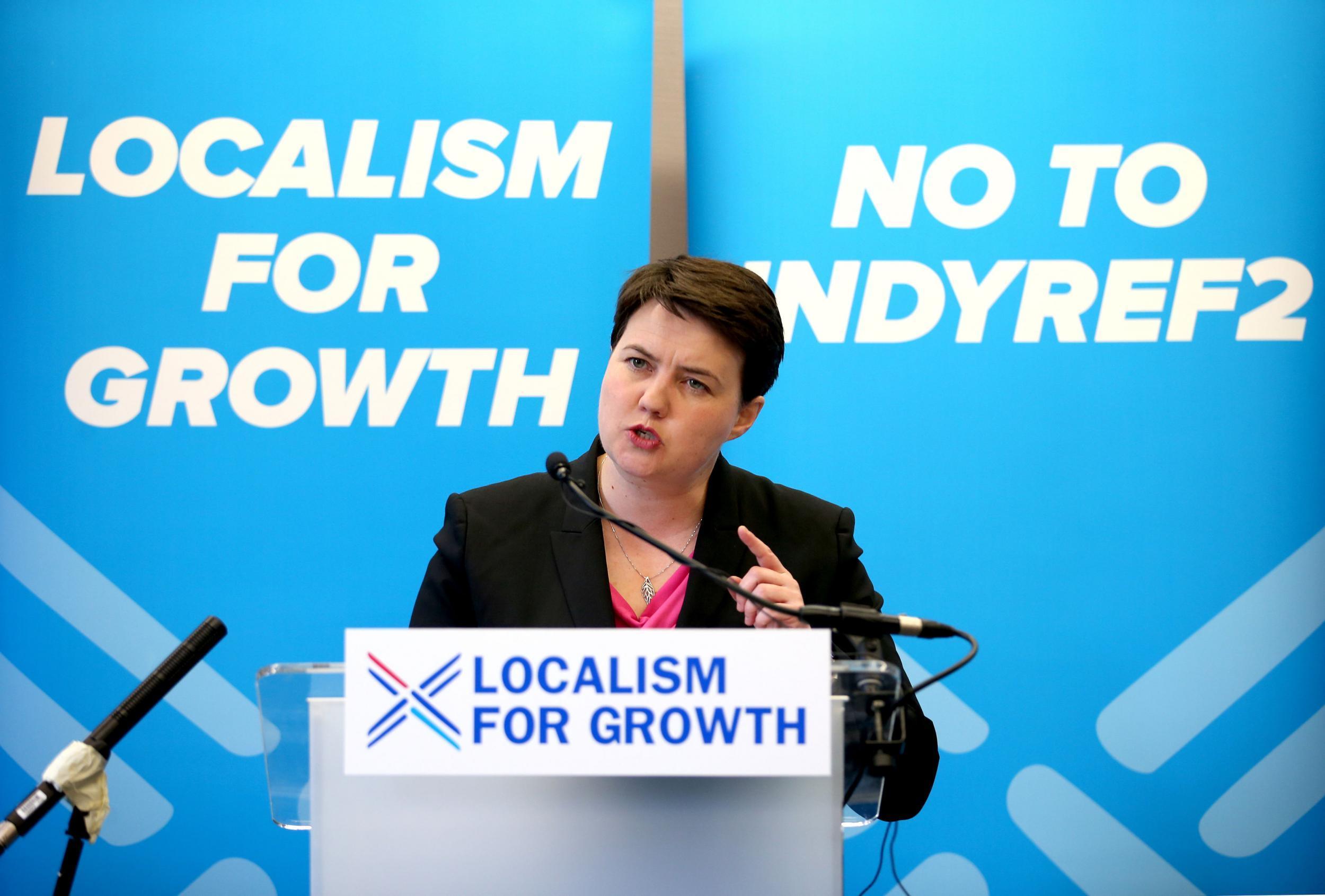The Tories are set to make gains in the Scottish local elections – but that's not necessarily good news for Ruth Davidson
Ruth Davidson's protest persona as 'defender of the Union' cannot continue if she makes significant gains – she needs to put her money where her mouth is


Your support helps us to tell the story
This election is still a dead heat, according to most polls. In a fight with such wafer-thin margins, we need reporters on the ground talking to the people Trump and Harris are courting. Your support allows us to keep sending journalists to the story.
The Independent is trusted by 27 million Americans from across the entire political spectrum every month. Unlike many other quality news outlets, we choose not to lock you out of our reporting and analysis with paywalls. But quality journalism must still be paid for.
Help us keep bring these critical stories to light. Your support makes all the difference.
On the 4 May, people across the UK will cast their votes in the local council elections. The campaign itself may have been overshadowed by the general election announcement, but the results – particularly in Scotland – are sure to garner attention.
If a year is a long time in politics, five years in Scottish politics is a verifiable lifetime. In 2012, when Scotland last voted in council elections, the SNP took 32 per cent of the vote share and 425 seats, while Labour won 31 per cent of first preference votes and 394 seats. Despite being narrowly beaten in the overall vote by the SNP, Labour currently are in control of or propping up 19 out of 32 local council administrations.
Notably, the Scottish Conservatives lagged behind, at only 13 per cent and 115 seats. A recent Panelbase poll on general election voting intentions showed support for Ruth Davidson’s party at 33 per cent – a level which, if replicated in June, could see the Scottish Conservatives return up to 12 MPs.
General elections and council elections are very different beasts, but could the dividing lines of the independence question and the collapse of Labour see the Scottish Conservatives make significant gains on their 2012 result?
In Scotland, Davidson is a recognisable figure. She is the woman who led the Scottish Tories to their best ever election result in the 2016 Holyrood elections, at 22 per cent of the vote. Much of the commentary of this success was laid squarely on the shoulders of Davidson herself. She is regularly heralded as a “different kind of Tory’’ and the woman whose charm and personality single-handedly brought about a revival of Tory fortunes in Scotland. As a gay working class woman, partial to a bit of close-to-the-bone humour and self-deprecation, it is easy to see how she is viewed as breaking the mould of what a traditional Tory looks like.
She may be “different” – but this force of personality often also helpfully detracts from her accountability as a leader whose party is in government at Westminster.
Ruth Davidson didn’t manage to push the Labour Party into 3rd place in the last Holyrood election through dazzling policy proposals. Since the referendum in 2014, the constitutional question has remained a focus for voters. The Scottish Tories successfully capitalised on that by framing themselves as the party of and for the No voter. They picked up enough votes on the back of it to edge themselves onto the opposition benches. Davidson has fought the council elections using the same strategy, with leaflets emblazoned with ‘”Say no to a 2nd Independence referendum”.
For all her insistence that the SNP “get on with the day job” Davidson and her party actually fare much better when focusing on the independence question. It allows her to pop up in TV studios as the self-styled defender of the Union, and avoid any difficult questions about her own party and how their policy decisions impact Scotland. So she can – without irony or challenge – issue stern criticism of the Scottish Government for their “divisive” call for a second referendum, while skirting around the undoubtedly divisive and chaotic EU referendum that her party oversaw.
She manages to emerge from many interviews unscathed, safe in the comfortable, cuddly Tory territory. This media-savvy persona is a very Scottish, Boris Johnson-style divert and distract technique – but it’s not a sustainable one. Recent weeks have seen the shine start to dull on Ruth Davidson’s political star status. She has been widely criticised for her support of the two child tax credit policy (family cap) and the odious “rape clause” element of it. It’s difficult to maintain the “different kind of Tory” guise when she dismisses the concerns of rape survivors by saying ‘’all they have to do is tick a box’’.
Her love of wacky photo-ops, which were a feature of her Holyrood election campaign, have backfired this time round. She was blasted for posing on a mobility scooter, while 800 disabled people per week are losing their mobility vehicles due to UK government cuts. And Davidson’s “straight-talking” style landed recently her in hot water when she made reference to Jean-Claude Junker’s drinking habits.
Ruth Davidson and the Scottish Conservatives may well make some gains on Thursday night. It’s difficult to see how they won’t, given the constitutional divide that still dominates Scottish politics, and the misfortunes of the Scottish Labour party. Such success may prove bittersweet, however. A Tory revival of-sorts will lead to greater scrutiny of what their policies for Scotland actually are. Being the party that is steadfast against independence has benefitted Davidson thus far, but going forward, voters are going to expect some substance behind the battle-cry.
Join our commenting forum
Join thought-provoking conversations, follow other Independent readers and see their replies
Comments